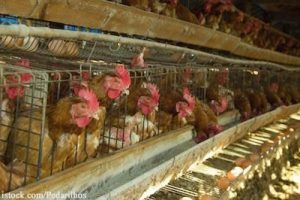Senator Dianne Feinstein (D-CA) and six other senators have introduced S. 3239, a bill that would codify regulations on hen treatment standards. The measure also sets standards for egg labeling. The states have their own standards for labeling, and these differences prevent some egg producers from selling their eggs in other areas.
 In January 2012, the Humane Society of the United States and the United Egg Producers reached an agreement to improve the living conditions of egg-laying hens. That agreement would double the chicken’s living space to 116 square inches, require that all of the animals have a natural environment so they can sit on perches and scratch, and end the practice of withholding food and water to extend the laying cycle.
In January 2012, the Humane Society of the United States and the United Egg Producers reached an agreement to improve the living conditions of egg-laying hens. That agreement would double the chicken’s living space to 116 square inches, require that all of the animals have a natural environment so they can sit on perches and scratch, and end the practice of withholding food and water to extend the laying cycle.
The restrictive living conditions can help promote the growth of bacteria in factory farmed chickens. Consumers Reports conducted a study in 2010 that found more than 66% of these birds are infected with Salmonella and Campylobacter. And the bacteria can live in the hen’s ovaries, so eggs are contaminated from the inside before the shell is formed.
Agricultural groups such as the American Farm Bureau, the National Farmers Union, and the National Turkey Federation are fighting the bill, claiming it is too restrictive. And the Humane Farming Association also opposes the bill, for a different reason. They claim it will override more stringent state laws and keep egg-laying hens in cages.
Bradley Miller, National Director of that group, said in a press release “this bill would preempt state laws, such as California’s Proposition 2, and is a direct assault upon egg laying hens, voters, and states’ rights.” The group also claims that “there is no such thing as an ‘enriched’ battery cage.” Dr. Karen Davis, President of United Poultry Concerns says that “even if the proposed federal law passes, the majority of hens will remain entombed in cages on factory farms.”
California’s Proposition 2 prohibits the confinement of farm animals that does not let them turn around freely, lie down, stand up, and fully extend their limbs. It is set to go into effect on January 1, 2015. This was the first statute in the nation to address the issue of battery cages.
Groups supporting the measure include the ASPCA, Mercy for Animals, Animal Legal Defense Fund, Consumer Federation of America, and the American Veterinary Medical Association, along with the Humane Society and United Egg Producers.
The co-sponsors of the bill are Senators Richard Blumenthal (D-CT), Scott Brown (R-MA), Maria Cantwell (D-WA), Jeff Merkley (D-OR), David Vitter (R-LA), and Ron Wyden (D-OR).
If you’d like to weigh in on this issue, you can call your senators about supporting S. 3239.





This issue is 100% about animal rights and 0% about food safety. The Consumer Reports survey you site is about broiler chickens, not laying hens. Even the AVMA which supports this bill recognizes that conventional cages present the lowest risk of infection (see http://www.avma.org/reference/backgrounders/laying_hen_housing_bgnd.pdf).
While I agree that this issue is about animal rights, it is about food safety too. Chickens transmit Salmonella and other bacteria to eggs, because those bacteria are present in their ovaries. The Humane Society has gathered studies showing that Salmonella rates in caged flocks are high. They state “The only two studies ever published comparing risk at the consumer level both tied Salmonella infection to cage egg consumption.”
The study you cite mentions coccidiosis and roundworms as the infections in question, not Salmonella contamination.
And given that so many people eat undercooked and raw eggs (see Even the Pros Do It: Food Safety Mistakes), egg producers should be doing everything in their power to reduce bacteria counts in hens.